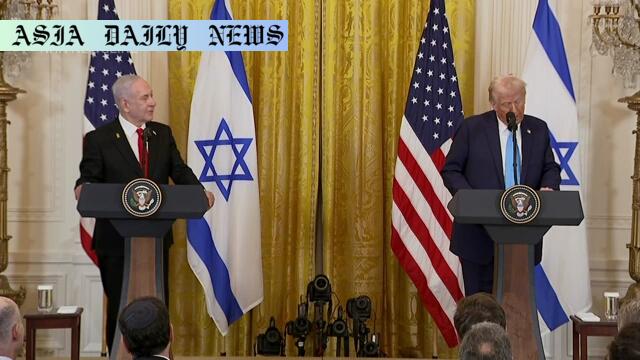Gaza Strip, US President Donald Trump proposes taking ownership of the Gaza Strip for redevelopment and disarmament of the region.

Trump’s Proposal: US Ownership of the Gaza Strip
In a bold announcement during a press conference with Israeli Prime Minister Benjamin Netanyahu, US President Donald Trump proposed that the United States take ownership of the Gaza Strip. According to Trump, the move would entail redeveloping the war-ravaged region to ensure stability and prosperity for its residents. He also emphasized that the US would handle the disarmament of the area, including the dismantling of unexploded bombs and dangerous weaponry.
Netanyahu’s Reaction and the Context
Netanyahu, the first foreign leader to visit the White House since Trump’s second term began, responded optimistically but cautiously, noting that this initiative represents a “different future” for Gaza which could be worth investigating. The proposal came at a pivotal moment, as Israel and Hamas proceed with a ceasefire agreement facilitated by global actors, including the United Nations. The agreement involves a complete withdrawal of Israeli troops from Gaza and the release of hostages held by Hamas.
Current Situation in Gaza
As part of the ceasefire terms, northern Gaza is experiencing a significant population shift, with over half a million Palestinians crossing into safer regions within the past week. This fragile peace, currently under UN monitoring, presents an opportunity for long-term solutions to be implemented. However, the feasibility of such a plan remains a point of debate among international observers and stakeholders.
Rebuilding a War-Ravaged Region
Trump’s vision involves not only disarmament but also substantial redevelopment efforts to restore infrastructure, housing, and essential services for the people of Gaza. He believes that US ownership will ensure long-term accountability and effective management of resources. Critics, however, question the legality and ethicality of such a move, highlighting concerns over sovereignty and the role of international law.
Global Reactions
The international community has responded with mixed reactions to Trump’s proposal. Some view it as a potential pathway to lasting peace in the region, while others see it as an overreach of US authority and interference in Middle Eastern affairs. The United Nations and several governments have yet to issue formal statements, although analysts expect significant diplomatic challenges if the plan is pursued.
The Road Ahead
If implemented, the plan would require years of effort, substantial funding, and buy-in from local and global stakeholders. The US would need to address humanitarian concerns while balancing diplomatic relations with Israel, Palestine, and the broader Middle East. Most importantly, the voices of Palestinians must be at the forefront of any decision-making process regarding the future of Gaza.
As the ceasefire continues and plans unfold, the world watches closely to see whether this proposal marks the beginning of a new chapter for Gaza or incites further controversy in an already complex geopolitical landscape.
Commentary
Analyzing Trump’s Ambitious Proposal
President Trump’s plan to take ownership of the Gaza Strip is undoubtedly ambitious and has sparked widespread discussion. On one hand, the idea of a major global power stepping in to mitigate decades of suffering and restore a sense of normalcy to Palestinian lives could bring hope to many. On the other hand, it raises a host of questions, particularly about sovereignty, legality, and the logistical challenges such a move would entail.
Ethical and Diplomatic Implications
While Trump’s intent appears centered on humanitarian redevelopment and security, it is important to consider the ethical implications of such an action. The Gaza Strip belongs to its people, and any plans for its future must prioritize their input and rights. Additionally, the diplomatic consequences of US ownership could create tensions with neighboring countries and further complicate the peace process in the Middle East.
Prospects for Peace
At the heart of the proposal lies the possibility of peace. If successful, the redevelopment efforts could drastically improve living conditions in Gaza and foster a more stable region. However, implementing such a plan would require unprecedented levels of cooperation among regional powers, international organizations, and, most importantly, the inhabitants of Gaza. Without their full support, even the most well-intentioned initiatives are unlikely to succeed.
Ultimately, Trump’s proposal opens up an important dialogue about the future of Gaza, but it must be executed in a way that respects the rights and aspirations of its people. Only time will tell whether this bold idea evolves into a genuine solution or becomes another footnote in the complex history of the region.


